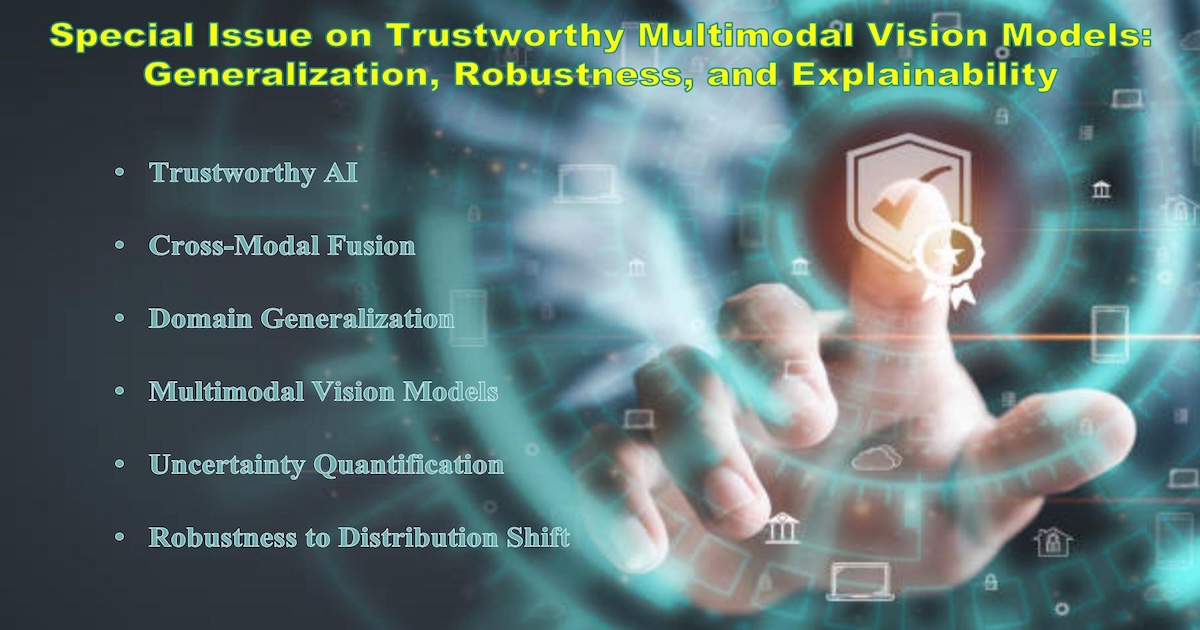Trustworthy Multimodal Vision Models: Generalization, Robustness, and Explainability
A special issue of Journal of Imaging (ISSN 2313-433X). This special issue belongs to the section "Computer Vision and Pattern Recognition".
Deadline for manuscript submissions: 31 August 2026 | Viewed by 90

Special Issue Editors
Interests: artificial intelligence; medical image processing; cross-domain learning; industry-scale large modeling; multimodal data fusion
Interests: computer vision; machine learning; multimodal large language model
Special Issue Information
Dear Colleagues,
Modern vision models increasingly integrate multiple data modalities, such as images, text, time-series signals, and sensor inputs, to capture richer semantic representations. However, their performance often degrades under distribution shifts, missing modalities, or unseen environments, and their predictions frequently lack calibrated uncertainty and interpretable reasoning. This Special Issue seeks to advance the development of trustworthy multimodal vision models that are not only accurate but also generalizable, robust, and explainable. We welcome original research on multimodal fusion under partial observability, domain generalization, uncertainty-aware learning, cross-modal explainability, and human-aligned validation. Contributions should demonstrate how trustworthiness is explicitly incorporated into the model architecture, training objective, or inference mechanism. The Special Issue aims to move beyond benchmark-driven accuracy toward models that reliably support decision-making in complex, open-world settings, where safety, transparency, and adaptability are essential.
Topics of interest include, but are not limited to:
- Domain generalization, adaptation, and robustness for multimodal vision tasks, especially in low-resource or label-scarce settings;
- Cross-modal alignment and fusion strategies that preserve semantic fidelity and support failure-aware inference;
- Human-in-the-loop reinforcement learning frameworks for interactive model refinement, uncertainty-guided querying, and expert feedback integration;
- Uncertainty quantification and calibration in deep vision models;
- Novel applications of trustworthy multimodal intelligence in healthcare;
- Trustworthy multimodal medical vision models with emphasis on generalization across clinical sites, imaging protocols, and patient populations;
- Evaluation protocols and benchmarks for reliability beyond accuracy (e.g., failure mode analysis, stress testing);
- Test-time adaptation and self-monitoring mechanisms under environmental variability.
Techniques to enhance explainability in multimodal vision models through attention visualization, feature attribution, or causal reasoning.
Prof. Dr. Xun Gong
Dr. Junzhou Chen
Dr. Chong Ma
Guest Editors
Manuscript Submission Information
Manuscripts should be submitted online at www.mdpi.com by registering and logging in to this website. Once you are registered, click here to go to the submission form. Manuscripts can be submitted until the deadline. All submissions that pass pre-check are peer-reviewed. Accepted papers will be published continuously in the journal (as soon as accepted) and will be listed together on the special issue website. Research articles, review articles as well as short communications are invited. For planned papers, a title and short abstract (about 250 words) can be sent to the Editorial Office for assessment.
Submitted manuscripts should not have been published previously, nor be under consideration for publication elsewhere (except conference proceedings papers). All manuscripts are thoroughly refereed through a single-blind peer-review process. A guide for authors and other relevant information for submission of manuscripts is available on the Instructions for Authors page. Journal of Imaging is an international peer-reviewed open access monthly journal published by MDPI.
Please visit the Instructions for Authors page before submitting a manuscript. The Article Processing Charge (APC) for publication in this open access journal is 1800 CHF (Swiss Francs). Submitted papers should be well formatted and use good English. Authors may use MDPI's English editing service prior to publication or during author revisions.
Keywords
- trustworthy AI
- multimodal vision models
- domain generalization
- uncertainty quantification
- distribution shift
- cross-modal fusion
Benefits of Publishing in a Special Issue
- Ease of navigation: Grouping papers by topic helps scholars navigate broad scope journals more efficiently.
- Greater discoverability: Special Issues support the reach and impact of scientific research. Articles in Special Issues are more discoverable and cited more frequently.
- Expansion of research network: Special Issues facilitate connections among authors, fostering scientific collaborations.
- External promotion: Articles in Special Issues are often promoted through the journal's social media, increasing their visibility.
- Reprint: MDPI Books provides the opportunity to republish successful Special Issues in book format, both online and in print.
Further information on MDPI's Special Issue policies can be found here.








